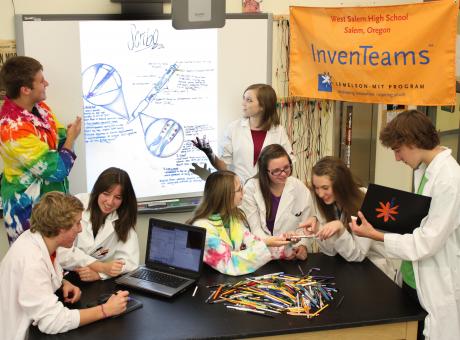West Salem High School InvenTeam
Many people find it difficult to determine when a watermelon is ripe. Contrary to popular belief, watermelons do not ripen once picked from the vine. This problem plagued West Salem High School InvenTeam student Ryan Bonacker, who worked at a grocery store and was often asked by customers if a watermelon was ripe or not. The team devised a portable watermelon thumper to test the ripeness of a watermelon, intended for use by farmers, supermarkets or consumers. The team focused on electronic acoustical analysis to determine ripeness, based on a direct correlation found between the frequency level and the sugar content of a watermelon. Ripeness is indicated by a digital sound after thumping an instrument against the watermelon. It is believed ripe watermelons have waveform decay signatures that demonstrate a longer decay signal than unripe watermelons. The thumping finds the length of the decay curve and calculates a ratio between decay time and initial amplitude. A high ratio illuminates a light emitting diode (LED) that represents a ripe signal. A low ratio lights up a different signal to indicate an unripe melon. The team split into groups to collect quantitative data to correlate each individual thump with actual ripeness. One group tested for sugar content in the watermelon, while another group tested its pH content. The last group examined the color of the watermelon. They created charts and graphs of this data. One of the team members planted watermelons and cultivated them at the proper temperature in order to perform the tests. The team conducted testing using LoggerPro software combined with LabPro hardware and a microphone. The students tested approximately 40 watermelons and then opened the melons to see if the readings were accurate. They discovered that a longer decay curve indicated a riper melon, and a higher decay curve indicated an unripe melon. The team created prototypes throughout the design process and manufactured two visually appealing models. The team received support from community sponsors such as Botsford and Goodfellow Inc., Oregon State University, Ikon, Tektronix, and Whitney Farms. The West-Salem High School InvenTeam plans to continue with the invention by conducting tests to verify the data. The students also plan to test different varieties of watermelons to make the invention universal. They hope it will help farmers, consumers and retailers, and they also plan to apply the invention to other types of fruit.


